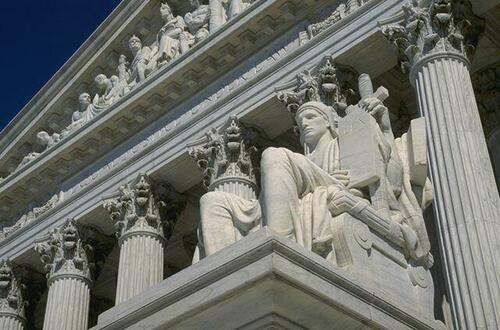In a rigorous and important study that should surprise no one, University of Notre Dame law professor Derek Muller has found that of over 3,200 amicus briefs submitted to the U.S. Supreme Court in cases filed and decided between 2018 and 2022 by lawyers at the nation’s largest law firms, 64% favor liberal causes.
The pronounced tilt by America’s elite lawyers toward the political left is a well-known phenomenon. As someone who practiced in “Big Law” for over a decade, I and many of my colleagues came to view that tilt as a given. Studies have since shown that the American legal profession overall tilts politically liberal.
What I found particularly notable about Muller’s study, however, was the revelation that elite firms have monolithically advanced leftist positions in five cases since 2018 that Muller describes as possessing “high salience.” These are cases in which exceptionally large numbers of amicus briefs were filed – at least 60 in each case – an indication of their real or perceived significance. These cases, in Muller’s words, “touch on some of the most divisive areas of political controversy” in America today.
These high-salience cases include Dobbs v. Jackson Women’s Health Organization, which overturned Roe v. Wade; Bostock v. Clayton County (consolidated with Harris Funeral Homes v. Equal Employment Opportunity Commission), which found that employment actions taken solely because of sexual orientation or gender identity violate Title VII’s ban on “sex” discrimination; and Fulton v. City of Philadelphia, which involved a challenge to a city ordinance requiring a Catholic foster and adoption service to violate its beliefs by placing children with unmarried and same-sex couples. Also included are another abortion case, June Medical Services v. Russo, and a Second Amendment case, New York State Rifle and Pistol Association v. Bruen.
Abortion, religious freedom, gender identity, and Second Amendment rights – these are the flashpoint social issues within American society. And in the five high-stakes cases studied by Muller, in which Big Law lawyers filed 98 merits amicus briefs, elite firms sided with the liberal position a staggering 94.9% of the time.
This data point provides a unique, and troubling, window into an elite stratum of American culture. As Muller notes in his study, large law firms very frequently file amicus briefs concerning cultural issues with the Supreme Court on a pro bono – i.e., free of charge – basis. These are projects of choice. They more closely reflect the personally held values of the drafters than do paid briefs in a run-of-the-mill commercial case, for instance.
Muller’s study suggests that many of the elite members of the law profession hold views that are anathema to approximately half of all Americans. They seem at one with another lawyer, President Barack Obama, who once said of rural voters dislocated by rapid economic change that “they cling to guns or religion, or antipathy to people who aren’t like them.”
And much like the former president, these denizens of elite firms frequently turn up in positions of great influence, including the general counsel suites of Fortune 500 companies, on the bench in state and federal courtrooms, and in key posts in presidential administrations. Moreover, much like the former president, they are the products of elite law schools and often return to those schools in varying capacities as professors.
Even more significant than the disconnect between many elite attorneys and the vast numbers of conservative Americans, however, is the willingness of those attorneys to use the machinery of the law to impose their views. One may object that this accusation is unfair – don’t all attorneys briefing critical cases before the Supreme Court share the goal of imposing their views on the nation? Wouldn’t that apply to me and my employer, Alliance Defending Freedom, which regularly advocates before the Supreme Court, including in four of Muller’s five high-salience cases?
In a word, no.
Take Muller’s high-salience cases. In Bostock, the liberal position successfully sought to use the power of the federal government to force private business owners to make certain employment decisions. In Fulton, the liberal position sought to use the power of local government to force a religious organization to violate its deeply held beliefs. In the gun rights case, the liberal position sought to use the power of government to restrict gun owners’ Second Amendment rights. Even in Dobbs, the liberal position was in favor of government coercion – namely, using the power of the court to prevent elected officials from passing laws to regulate abortion consistent with the will of the voters. In each case, the conservative position advocated for greater self-government and freedom from government overreach and control.
So, the results of Muller’s study are both unsurprising and highly illuminating. Our society is one in which large swaths of elites increasingly function as a monoculture detached from, and at times disdainful of, the deeply held religious, cultural, and social beliefs of many Americans. And they are increasingly willing to use the power of the state to impose those beliefs on dissenters.
But Muller’s study also serves to clarify the power of ideas, even when they run counter to the near-consensus views of those elites. In three of Muller’s five high-salience cases, the “conservative” position prevailed despite overwhelming opposition from Big Law, while a fourth, June Medical, was effectively nullified by Dobbs. And in this fact lies the hopeful message of the good professor’s study – that truth, well-spoken and resolutely defended, can still carry the day against even the longest odds.
This article was originally published by RealClearPolitics and made available via RealClearWire.
Ryan Bangert is senior vice president of strategic initiatives and special counsel to the president for Alliance Defending Freedom (@ADFLegal).
